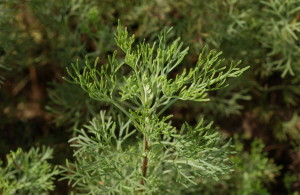Abrotanum is a species of flowering plants in the sunflower family. It is native to Eurasia and Africa but naturalized in scattered locations in North America.
Contents
Uses
A yellow dye can be extracted from the branches of the plant, for use with wool. Its dried leaves are used to keep moths away from wardrobes. The volatile oil in the leaves is responsible for the strong, sharp, scent which repels moths and other insects. It was customary to lay sprays of the herb amongst clothes, or hang them in closets, and this is the origin of southernwood’s French name, “garderobe” (“clothes-preserver”). Judges carried posies of southernwood and rue to protect themselves from prisoners’ contagious diseases, and some church-goers relied on the herb’s sharp scent to keep them awake during long sermons.
The pungent, scented leaves and flowers are used in herbal teas. Young shoots were used to flavor pastries and puddings. In Italy, it is used as a culinary herb.
Benefits
- It treats Rheumatic traumas together with heart disease, anxiousness and diarrhoea.
- Abrotanum is a bitter herb that is believed to have many medicinal properties. It is thought to strengthen the digestive syste by increasing the production of the digestive juices. Many herbalist were known to use it, and some still do, as an internal remedy in tea form to treat loss of appetite and indigestion (dyspepsia) associated with inadequate bile secretion.
- It has also been used for urinary tract infections and for bronchitis and other upper respiratory infections. The herb may be used as a sedative in nervous gastrointestinal disorders and it may be used in the same way as other Artemisia species to regulate irregular menstruation.
- Externally, abrotanum can be used in the form of a decoction or compress for chilblains, swellings, abrasions and to stop bleeding and promote healing. The herb is thought to increase blood flow to the skin and to have an anti-inflammatory and disinfectant effect mainly against fungal diseases.
- The fresh or dried leaves can be used in spice mixtures and traditionally it was used as a flavor ingredient in the same way as wormwood in herbal vinegars and some liqueurs.
Cautions
Southerwood, just as wormwood (Artemisia absinthium) and mugwort (Artemisia vulgaris), has a reputation of causing miscarriages and have a stimulating effect on the uterus so it should not be used during pregnancy. Children under 12 should avoid internal consumption of the plant.
In some instances plants belonging to the genus Artemisia are known to cause both skin rashes and allergic reactions so caution is advised when handling southerwood.
Interactions
None are recorded. Please consult a specialist.
Other names
Other common names include: old man, boy’s love, oldman wormwood, lover’s plant, appleringie, garderobe, Our Lord’s wood, maid’s ruin, garden sagebrush, European sage, sitherwood and lemon plant.
References
Source: Wikipedia, https://en.wikipedia.org/wiki/Artemisia_abrotanum
Homeo4happylife, http://www.homeo4happylife.com/2012/07/abrotanum-symptoms-and-uses.html
HerbalSupplementResource, http://www.herbal-supplement-resource.com/southernwood-benefits.html

